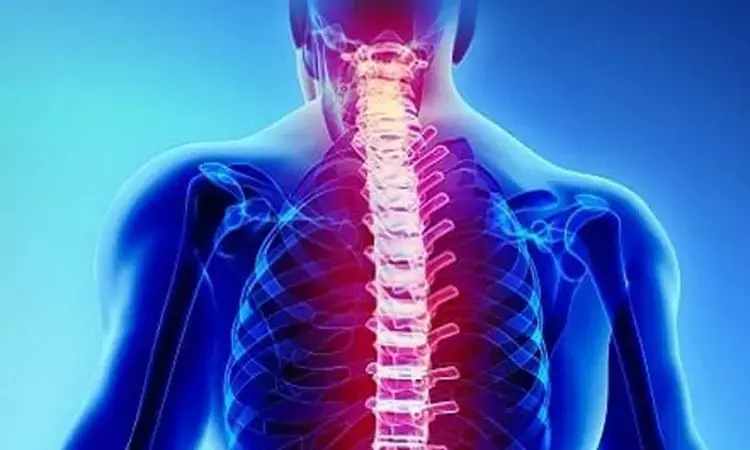- Home
- Medical news & Guidelines
- Anesthesiology
- Cardiology and CTVS
- Critical Care
- Dentistry
- Dermatology
- Diabetes and Endocrinology
- ENT
- Gastroenterology
- Medicine
- Nephrology
- Neurology
- Obstretics-Gynaecology
- Oncology
- Ophthalmology
- Orthopaedics
- Pediatrics-Neonatology
- Psychiatry
- Pulmonology
- Radiology
- Surgery
- Urology
- Laboratory Medicine
- Diet
- Nursing
- Paramedical
- Physiotherapy
- Health news
- Fact Check
- Bone Health Fact Check
- Brain Health Fact Check
- Cancer Related Fact Check
- Child Care Fact Check
- Dental and oral health fact check
- Diabetes and metabolic health fact check
- Diet and Nutrition Fact Check
- Eye and ENT Care Fact Check
- Fitness fact check
- Gut health fact check
- Heart health fact check
- Kidney health fact check
- Medical education fact check
- Men's health fact check
- Respiratory fact check
- Skin and hair care fact check
- Vaccine and Immunization fact check
- Women's health fact check
- AYUSH
- State News
- Andaman and Nicobar Islands
- Andhra Pradesh
- Arunachal Pradesh
- Assam
- Bihar
- Chandigarh
- Chattisgarh
- Dadra and Nagar Haveli
- Daman and Diu
- Delhi
- Goa
- Gujarat
- Haryana
- Himachal Pradesh
- Jammu & Kashmir
- Jharkhand
- Karnataka
- Kerala
- Ladakh
- Lakshadweep
- Madhya Pradesh
- Maharashtra
- Manipur
- Meghalaya
- Mizoram
- Nagaland
- Odisha
- Puducherry
- Punjab
- Rajasthan
- Sikkim
- Tamil Nadu
- Telangana
- Tripura
- Uttar Pradesh
- Uttrakhand
- West Bengal
- Medical Education
- Industry
Pulmonary cement embolism- serious complication in percutaneous vertebroplasty

Researchers from a recent study have observed that pulmonary cement embolism (PCE) is a rare but serious complication in percutaneous vertebroplasty (PKP) or kyphoplasty (PVP) and that its real incidence is underestimated due to the lack of postoperative pulmonary imaging examination, as published in the Journal of Orthopaedic Surgery and Research.
At present, percutaneous vertebroplasty (PVP) and kyphoplasty (PKP) are widely used in osteoporotic vertebral compression fractures (OVCFs), spinal metastasis, and multiple myeloma. This minimally invasive surgery can effectively relieve pain, maintain the stability of the spine, and prevent further collapse and kyphosis of the spine.
However, it is not absolutely safe; complications related to the operation are often encountered, among which intraoperative cement leakage is the most common complication.
Therefore, Dexin Zou and colleagues from the Department of Spine Surgery, Yantaishan Hospital, Yantai, Shandong, China conducted the present study with the purpose to evaluate the risk factors and incidence of pulmonary cement embolism (PCE) during percutaneous vertebroplasty (PVP) or kyphoplasty (PKP) for osteoporotic vertebral compression fractures (OVCFs) based on postoperative computed tomography (CT).
A total of 2344 patients who underwent PVP or PKP due to OVCFs in the spine center were analyzed retrospectively. According to the detection of postoperative pulmonary CT, the patients were divided into two groups: pulmonary cement embolism group (PCE group) and non-pulmonary cement embolism group (NPCE group).
Demographic data in both groups were compared using the χ2 test for qualitative data and the unpaired t test for quantitative data. Multiple logistic regression analysis was carried out to identify risk factors that were significantly related to the PCE resulting from cement leakage.
The following results were seen-
- PCE was found in 34 patients (1.9% 34/1782) with pulmonary CT examination after operation.
- There was no statistically significant difference in the parameters such as age, gender, body mass index (BMI), and cement volume in the two groups.
- Patients with three or more involved vertebrae had a significantly increased risk to suffer from PCE than those with one involved vertebra (p=0.046 OR 2.412 [95% CI 1.017–5.722]).
- Patients who suffered thoracic fracture had a significantly increased risk to suffer from PCE than those who suffered thoracolumbar fracture (p=0.001 OR 0.241 [95% CI 0.105–0.550]).
- And significantly increased PCE risk also was observed in thoracic fracture compared with lumbar fracture patients (p=0.028 OR 0.094 [95% CI 0.114–0.779]).
- The risk of PCE within 2 weeks after fracture was significantly higher than that after 2 weeks of fracture (p=0.000 OR 0.178 [95% CI 0.074–0.429]).
- Patients who underwent PVP surgery had a significantly increased PCE risk than those who underwent PKP surgery (p=0.001 OR 0.187 [95% CI 0.069–0.509]).
Hence, the authors concluded that "the real incidence of PCE is underestimated due to the lack of routine postoperative pulmonary imaging examination. The number of involved vertebrae, fracture location, operation timing, and operation methods are independent risk factors for PCE."
Dr. Nandita Mohan is a practicing pediatric dentist with more than 5 years of clinical work experience. Along with this, she is equally interested in keeping herself up to date about the latest developments in the field of medicine and dentistry which is the driving force for her to be in association with Medical Dialogues. She also has her name attached with many publications; both national and international. She has pursued her BDS from Rajiv Gandhi University of Health Sciences, Bangalore and later went to enter her dream specialty (MDS) in the Department of Pedodontics and Preventive Dentistry from Pt. B.D. Sharma University of Health Sciences. Through all the years of experience, her core interest in learning something new has never stopped. She can be contacted at editorial@medicaldialogues.in. Contact no. 011-43720751
Dr Kamal Kant Kohli-MBBS, DTCD- a chest specialist with more than 30 years of practice and a flair for writing clinical articles, Dr Kamal Kant Kohli joined Medical Dialogues as a Chief Editor of Medical News. Besides writing articles, as an editor, he proofreads and verifies all the medical content published on Medical Dialogues including those coming from journals, studies,medical conferences,guidelines etc. Email: drkohli@medicaldialogues.in. Contact no. 011-43720751


